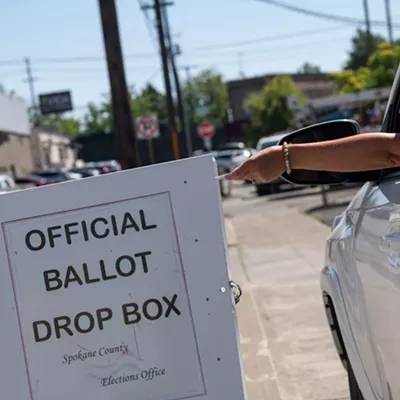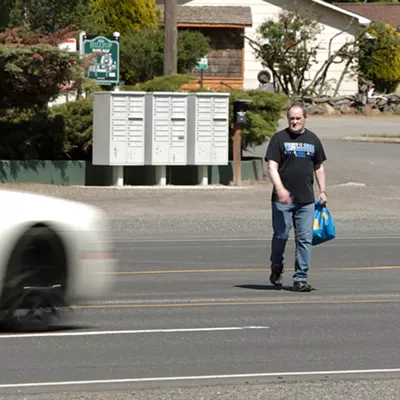On a table at Spokane’s Republican Victory Office sits a pile of brochures decorated with American flags and Uncle Sam hats.
“Fellow conservatives — you must read this!” the brochure reads. “FACT: Liberal democrats have controlled Olympia for 28 years and our State budgets have exploded.”
Washington is no swing state. It’s become purely Democratic. New York Times pollster Nate Silver gives Washington state a 99.5 percent chance of voting for President Obama. And if Attorney General Rob McKenna, consistently polling a few points behind his opponent, loses the race for governor, what then?
“We have not developed a depth,” says Kirby Wilbur, chair of the Washington State Republican Party. “Except in [Dino Rossi’s close 2004 governor race], which I think we won, we’ve had a chain of failures at the top.”
But Wilbur, a former talk-radio host, sees positives for the party. In 2008, he says, Washington was the only state in the country to gain more Republican legislators. He’s confident Republicans can take the governor’s office, swing three seats to gain control of the Senate and even — if things go particularly well — seize control of the House.
“My theory is we can counteract the impact of Seattle by being strong in Clark County, Snohomish, Pierce and Spokane County,” Wilbur says.
But the ideological hurdle remains: Washington state voters, says Mark Smith, a professor of political science at the University of Washington, tend to be socially liberal.
Abortion and gay marriage are winning issues for Republicans in the South, but not in Washington. Washington was one of the first states in the country to legalize abortion, and it may become one of the first states to vote to legalize gay marriage and decriminalize marijuana use.
When Republicans do well, it’s because Washington is comparatively economically conservative: Voters rejected attempts at a state income tax and have repeatedly bound the Legislature to a two-thirds threshold to raise taxes. So this year, state Republicans have tried to make the still-slumping economy the bigger issue.
“I don’t think the average woman voter is really worried about access to birth control and abortion — they’re worried, ‘Are my kids going to get good jobs?’” Wilbur says.
Over the long term, the demographic gap is expanding: Washington’s adding more Asian-Americans and Hispanics. It’s a state filled with young people, who typically vote Democrat, and mostly devoid of evangelical Christians, who typically vote Republican.
“As our state gets younger and it gets more diverse, people look at the Republican Party and see that they’re getting out of touch,” says Collin Jergens, communications director for the progressive organization Fuse Washington. “I think the state Republicans need to do some soul searching. … The state Republican brand is terribly damaged, and it will take them a long time to rebuild their credibility.”
Party platforms have a history of shifting, says Rep. Kevin Parker, R-Spokane. “I believe we’re in another one of those shifting times.” He says Republicans have been the ones fighting to make education — both funding and reform — a bigger priority in Olympia.
But the Republicans can’t change too easily. “Even in a state like Washington that is pretty strongly Democratic, the Republican base isn’t necessarily all that different. It’s just smaller,” Smith says. “In order to win a Republican primary, you need to appeal the Republican base.”
State party aside, each candidate comes coupled with their own personal platform. So on one hand, Rob McKenna has received praise from Grist, an environmental blog, for being one of “a vanishing breed of Republicans who not only acknowledge that climate change is happening but support government action to fight it.” But on the other hand, he’s best known for his constitutional challenge against Barack Obama’s health care reform, a crusade that may excite conservatives, but has been used as a bludgeon in the general election.
Meanwhile, state Sen. Michael Baumgartner focuses his U.S. Senate campaign on foreign policy and out-of-control national spending, but he also has a record of opposing abortion even in cases of rape. While state Senate candidate Nancy McLaughlin runs a campaign focused on lower taxes, she’s also adamantly opposed to gay marriage.
The Washington State Republican Party, however, plans on playing a longer game.
“When I ran for chairman last year, I talked about getting more involved in local politics,” Wilbur says. “The government that governs closest to you governs best.”
So this year, Spokane County Commissioner Todd Mielke, despite only having a direct impact on his county, received $40,000 from the state Republican Party.
Also, the GOP concentrated last year on local races in Bellevue and Spokane, dumping $63,000, last-minute, into the coffers of mayoral candidate David Condon. Condon, despite a dismal showing in the primary, managed to beat back the supposedly-safe Mary Verner to win the election. Asked about the impact the GOP’s donation had, Condon’s campaign opted not to comment for this story.
“What would David Condon have done without it?” Wilbur says. “It was important to us to have the second largest city in Spokane governed by a Republican.”
The donation from the party spurred a complaint to the state Public Disclosure Commission — accusing Spokane donors of using the state party as a way to skirt donor restrictions. Others complained that the non-partisan office of the mayor was being tarnished by party politics.
But to Wilbur, non-partisan offices don’t exist. “There is the partisan approach to garbage collecting,” Wilbur says. Next year, he says, there aren’t major statewide offices up for election. Expect the state party to dive into local races, pumping money into conservative city council candidates. Wilbur also hasn’t ruled out trying to influence races as small as school board, a strategy the Kootenai County Reagan Republicans have used successfully in Coeur d’Alene.
It’s part of a larger strategy for Wilbur to create a “farm team,” a group of up-and-coming candidates with the potential to run for higher office. But to do that you need to win races, he says.
“When you’re a committee chairman, you do not have a chance to show your skill and craft,” Wilbur says. “People in lower-level office who prove their competence … can then move up to the next level.”
It hasn’t always been easy to find candidates. He says Baumgartner was the only candidate who wanted to run against Maria Cantwell — and he was only in his first term and had no state-wide name recognition.
Wilbur points out a slew of upcoming stars in the party, including Secretary of State candidate Kim Wyman, Attorney General candidate Reagan Dunn, U.S. Representative Jaime Herrera Beutler and state Senators Andy Hill of Redmond and Ann Rivers of LaCenter.
The task of forming viable candidates becomes easier if McKenna wins, Wilbur says, and if the Republicans control Olympia. But even if McKenna isn’t elected, city council, commissioner, and mayoral seats make for ideal staging grounds.
“I sensed Cathy McMorris Rodgers has a long career … but what if she’s appointed by Romney?” Wilbur says. “We want to be ready.”
He’s thinking of David Condon.





















